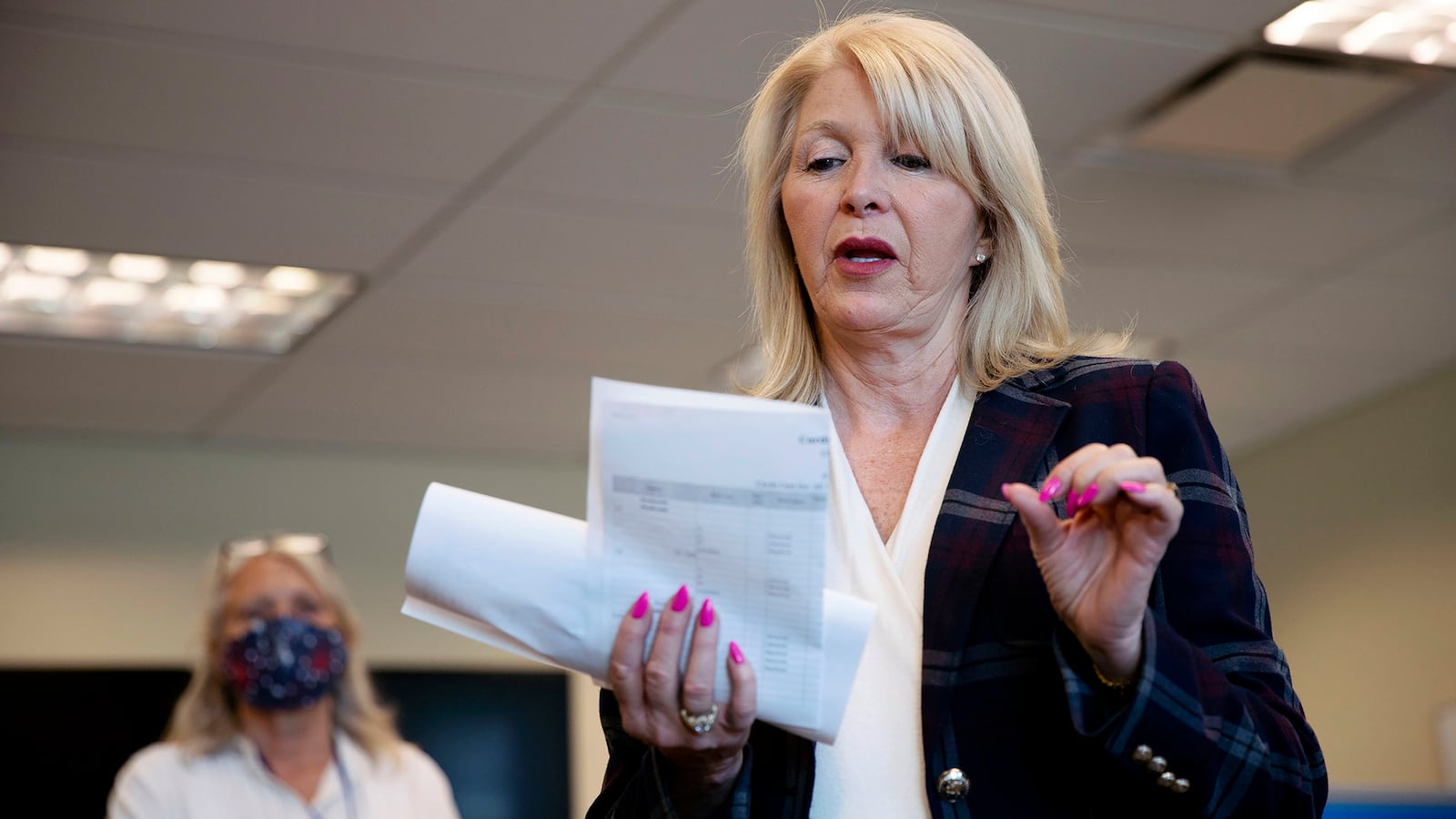Seated onstage at the most-hyped election conspiracy event of the year, the clerk of Mesa County, Colorado, Tina Peters, described herself as a crusader for election security.
“I’ve looked at it objectively,” Peters said of supposed issues in election data during her speech at MyPillow CEO Mike Lindell’s “Cyber Symposium” this month. “There’s some discrepancies there that I cannot deny, and I tell people, ‘I cannot unsee some of these things.’ If I’m going to be honest with the people of Mesa County and Colorado and all of you, I cannot unsee some of these things.”
But at home in Mesa County, some current and former officials have a different recollection of Peters’ tenure overseeing elections.
During Peters’ first year as clerk, in 2019, her office was blamed for leaving more than 570 uncounted ballots in a box, long past an election. Less than a year later, one of her office’s drop boxes leaked ballots, sending some floating in the summer breeze. Now Peters has gone underground, reportedly hiding in a safe house provided by Lindell, after she allegedly participated in a breach of Mesa County voting machine data this year. That data soon wound up on conspiracy websites, making Peters a folk hero among the MAGA set and the subject of an FBI investigation.
Peters (who did not return requests for comment) took office in 2019, after her predecessor, Sheila Reiner, reached her term limit. What followed was an unusually bombastic tenure in a typically low-drama role.
While overseeing the November 2019 general election, Peters’ office forgot to count 574 ballots, instead leaving them unattended in a drop box outside her office for months. That slip-up coincided with a rush of departures from Peters’ office. In December 2019, nearly 20 of Peters’ 32-person staff had departed, the Grand Junction Daily Sentinel reported at the time. More staff quit days after the missing ballots were discovered, in late February 2020, bringing the departure count over two dozen.
The Colorado Secretary of State’s Office told Peters to get her act together.
“The Secretary of State’s Office appointed someone to be in the [clerk’s] office to help with the election,” Amanda Polson, who served as elections director under Reiner, told The Daily Beast.
Patti Inscho, a Democrat and an experienced former Mesa County Clerk employee, was hired to help Peters with elections. But just two months into Inscho’s role, Peters fired her, accusing her of not doing assigned work—an allegation Inscho firmly denied. The rift turned ugly, with a Peters staffer filing a criminal complaint against Inscho for allegedly not working during a pandemic, the Colorado Sun previously reported. Police dismissed the report.
“Tina didn’t want to fight facts,” Inscho told The Daily Beast. “She wanted to damage people. She did and said a lot of things about me that are untrue. It hurt my reputation, and it’s hard to fight back against.”
Polson, who had been hopeful about Inscho’s hiring, saw her termination as a bad omen.
“Essentially, that person [Inscho] got shut out,” Polson said. “Nothing had improved in the office. She was still, we thought, not handling the ballot issue correctly. There are some lines you can’t cross in an election administration. That is one of them: not counting ballots that should be counted.”
In May 2020, Polson formally began an effort to recall Peters. The campaign took issue with Peters’ handling of the lost ballots, as well as her staff turnover, a series of controversial business expenses (including more than $3,000 in food), and her decision not to oversee a pair of town-level elections. (The towns were forced to oversee their own elections, costing them two to three times the typical cost of a county-run vote.)
Soon the recall campaign had another data point: a ballot drop-off box, installed by Peters’ office for the 2020 primary election, appeared defective, sending completed ballots blowing across a parking lot. Peters claimed the leak was staged and blamed a local couple who’d reported the issue. The couple denied the allegation in an interview with the Daily Sentinel, where a reporter also noted ongoing issues with ballots becoming lodged in the drop box.
Polson was joined in her signature-gathering campaign by Inscho and even, on occasion, Peters’ predecessor Sheila Reiner. “I agreed with the group that things weren’t being done properly,” Reiner told The Daily Beast. “I didn’t believe that Tina was doing a good job.”
She said she collected some signatures for the recall, but was not one of its organizers. Still, her involvement cost her. Reiner said she was antagonized by Peters loyalists who objected to the recall.
“I'm a Republican,” she said. “There are some other Republicans that felt like that I wasn't being loyal to the brand, let’s put it that way.”
Peters sometimes joined the counterattack on her critics. When the state appointed the treasurer of a nearby county to act as an independent overseer on the recall, Peters filed an official complaint about the treasurer’s political affiliation (a former Republican, current Democrat). That treasurer, Teak Simonton, said the allegation was baseless—in part because Simonton’s role mostly consisted of verifying signatures and other hard-to-fudge tasks.
“I think she probably knows as well as anyone that there’s really nothing that can be handled inappropriately based on one opinion on the situation,” Simonton told The Daily Beast. “The law is very straightforward and very detailed on exactly how you administer and verify signatures. So her concerns were really unwarranted. Anything that would have been done was verifiable and transparent. It’s my guess that she was hoping to bolster her position by diminishing my engagement because I’m a Democrat.” (Simonton was also tasked with compiling a report on Peters’ office, in which she praised Peters’ staffers but criticized the clerk as “distrusting, frequently rude and antagonistic.”)
Ultimately, the recall effort fell approximately 1,200 signatures shy of the 12,129 signers needed to advance by August 2020.
“I honestly believe that had there not been a pandemic, had there been big gatherings, that we would have passed that petition,” Inscho said. “We would have reached enough names. It was just too hard with everything shut down.”
Frustrated, the recall organizers had little recourse but to watch Peters settle in to administer the 2020 general election.
“Those of us who were involved in recall, it was very taxing on us, mentally and physically,” Polson said. “We all took a giant step back and figured that, if the recall failed, she was really someone else’s problem at that point. We had done what we could to deal with it and it didn’t work.”
When Donald Trump won Mesa County in November 2020, but not Colorado or the U.S. at large, Peters promoted an election conspiracy theory on Twitter. And by May 2021, investigators allege, she became personally involved in the intrigue.
On, or shortly before May 25, Peters or someone in her office switched off security cameras that monitored the county’s voting machines, Colorado Secretary of State Jena Griswold alleges. On the 25th, Peters is accused of allowing an unauthorized person, who used the name “Gerald Wood,” to access the machines and make copies of data, which were soon leaked to Ron Watkins, a conspiracy theorist who previously acted as an administrator for the fringe forum 8kun. Watkins and fellow travelers like Lindell attempted, unsuccessfully, to argue that the leaked data suggests malfeasance by voting machine company Dominion. (Dominion is suing Lindell and other election conspiracy theorists for defamation.)
Soon after the breach became public, Peters rode Lindell’s private jet to his “Cyber Symposium” in South Dakota, where she made her speech about “discrepancies” in Mesa County voting data. (For good measure, Peters also used taxpayer money to buy a United Airlines ticket to the symposium, which she listed in business expenses as a “conference,” the Daily Sentinel reported. Even larger is the cost of replacing 41 pieces of voting technology that were compromised during the breach.)
Although Peters denies wrongdoing in the data leak, the breach is now the subject of investigations by local, state, and federal investigations. And Peters is nowhere to be found. Last week, Lindell told Vice that he was helping Peters hide in an undisclosed location (originally Texas, he said, but she has since moved due to security concerns).
For Peters’ critics back home, it’s the latest development in an election security saga that should have ended one or two ballot fiascos ago.
“It’s kind of horrifying to watch. Several of us on the recall committee worked at the elections office. Seeing the work and trust that we built come crashing down was really hard to watch,” Polson said. “We figured something worse was going to happen. It was just a matter of when and how and what.”








